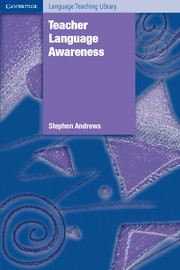Book contents
- Frontmatter
- Contents
- Acknowledgements
- Introduction
- Prologue: The challenge of being ‘language-aware’
- 1 Language Awareness, ‘Knowledge About Language’ and TLA
- 2 TLA and the teaching of language
- 3 TLA and the ‘grammar debate’
- 4 TLA and teachers' subject-matter cognitions
- 5 TLA and pedagogical practice
- 6 The TLA of expert and novice teachers
- 7 TLA and the native-speaker and non-native-speaker debate
- 8 TLA and student learning
- 9 TLA and teacher learning
- Epilogue: TLA and teacher professionalism
- Appendix
- References
- Index
- Publisher's acknowledgements
5 - TLA and pedagogical practice
Published online by Cambridge University Press: 30 July 2009
- Frontmatter
- Contents
- Acknowledgements
- Introduction
- Prologue: The challenge of being ‘language-aware’
- 1 Language Awareness, ‘Knowledge About Language’ and TLA
- 2 TLA and the teaching of language
- 3 TLA and the ‘grammar debate’
- 4 TLA and teachers' subject-matter cognitions
- 5 TLA and pedagogical practice
- 6 The TLA of expert and novice teachers
- 7 TLA and the native-speaker and non-native-speaker debate
- 8 TLA and student learning
- 9 TLA and teacher learning
- Epilogue: TLA and teacher professionalism
- Appendix
- References
- Index
- Publisher's acknowledgements
Summary
Introduction
The present chapter focuses on TLA in pedagogical practice, examining how the L2 teacher's language awareness both influences and is influenced by that teacher's engagement with the content of learning. The chapter begins with snapshots of various teachers' TLA and engagement with the content of learning, before moving on to considering the relationship between TLA and materials: to what extent do materials influence, determine or constrain TLA in pedagogical practice, and how far does TLA affect teachers' handling of materials?
As we have noted at various points so far, there is a crucial distinction between the two dimensions of TLA: the declarative dimension (the possession of subject-matter knowledge) and the procedural dimension (‘knowledge-in-action’). In order for the L2 teacher's handling of the content of learning to be ‘language-aware’, that teacher needs to possess not only a certain level of knowledge of the language systems of the target language, but also those qualities (i.e. the ‘awareness’) that will enable the subject-matter knowledge base to be accessed easily and drawn upon appropriately and effectively in the act of teaching.
The relationship between TLA and the way teachers engage with the content of learning in the act of teaching is a complex one. That complexity is partly a reflection of the different interpretations associated with the word ‘engagement’.
- Type
- Chapter
- Information
- Teacher Language Awareness , pp. 94 - 117Publisher: Cambridge University PressPrint publication year: 2007



